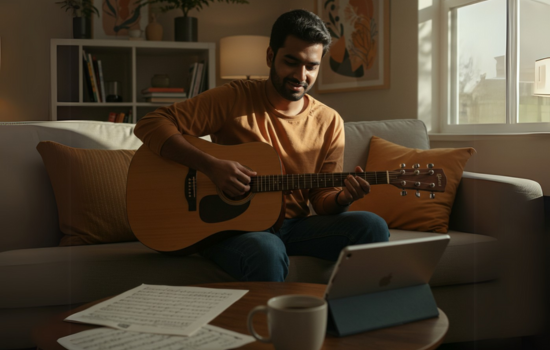Advertisements
Learn to play guitar at home and transform your life through music.
Discover how to turn your space into a creative studio without leaving home.
In this article, you'll explore basic techniques, digital resources, and practical tips for self-taught guitar mastery.
Start today and feel the satisfaction of creating melodies that accompany you every day.
Advertisements
Benefits of learning to play guitar at home
Learning to play guitar at home offers countless benefits, both personally and for your emotional and social well-being.
Practicing a musical instrument improves concentration, coordination, and connects you to a world full of creativity.
- Personal expression: The guitar is an extension of your emotions, allowing you to express feelings that words sometimes fail to capture.
- Flexibility and comfort: You don't need to travel or adjust your schedule; your home becomes the perfect place to practice whenever you want.
- Cognitive development: Musical practice stimulates memory, reasoning, and the ability to solve problems creatively.
- Stress reduction: Playing guitar acts as a natural stress reliever, helping you release tension and improve your mood.
- Connection opportunity: By mastering the instrument, you can share music with friends and family, strengthening bonds through a shared passion.
Advertisements
See also
- Apps to edit amazing videos from your mobile
- Safe apps to find a serious partner
- Monitor your glucose with total precision
- The 10 most affordable cars in the world!
- Discover the World of Automotive Mechanics
The ability to learn to play guitar from home democratizes access to music education, giving you the freedom to learn at your own pace and in the environment that inspires you most.
Equipment and preparation: The first step to success
Before diving into the world of guitar, it's essential to have the right equipment and a suitable practice space.
These elements will help you optimize your learning and enjoy every study session.
The right instrument
Choosing the guitar that suits your needs is essential to getting off to a good start.
There are different types, such as acoustic, classical, or electric guitars, each with unique characteristics.
- Acoustic guitar: Ideal for beginners due to its versatility and the ability to play without an amplifier.
- Classical guitar: With nylon strings, it is perfect for a warm sound and for those looking for a smooth start to their technique.
- Electric guitar: It requires an amp and effects, but it's the perfect choice for those who want to explore genres like rock and blues.
Choose the type of guitar that best aligns with your musical interests and budget, and make sure the instrument is in good condition and properly tuned.
Essential accessories
In addition to the guitar, there are some accessories that will make the learning process and daily practice easier.
- Digital tuner: It is essential to keep your guitar in tune and improve your musical ear.
- Picks of different thicknesses: They will help you experiment with different sounds and strumming techniques.
- Nut and capo: Useful tools for changing the key of songs and practicing various scales.
- Tape measure and sheet music stand: They allow you to organize your studies and maintain proper posture while playing.
Set up a comfortable, well-lit, and distraction-free practice space where you can focus on each chord and melody.
Basic techniques to start playing guitar
Mastering the fundamental techniques is the key to advancing in your guitar learning.
Start with simple exercises that will help you become familiar with the instrument and develop hand-eye coordination.
Correct posture and grip
The basis of good musical performance is correct posture.
Sit with your back straight and keep your shoulders relaxed to avoid tension.
- Arm position: Position your right arm naturally on the guitar, with your wrist flexible to facilitate strumming.
- Left hand on the fretboard: Make sure your fingers are positioned precisely on the frets without applying too much pressure.
- Relaxation and breathing: Maintain steady breathing to avoid stiffness in your hands and body.
Fingering and strumming exercises
Practicing scales, chords, and strumming patterns will help you develop the agility and strength needed to play fluently.
- Simple scales: Start with major and minor scales to familiarize yourself with the arrangement of notes on the fretboard.
- Basic chords: Learn chords like C, G, D, E minor, and A minor, which are the basis for many popular songs.
- Strumming exercises: Practice different strumming patterns, varying the speed and rhythm, to achieve dynamic accompaniment.
These exercises will help you lay the foundation for playing songs and develop your personal style over time.
Resources and apps for learning to play guitar at home
Today's technology offers multiple digital resources that facilitate self-learning.
From video tutorials to interactive apps, online tools can be great allies in your process.
Tutorials and videos on YouTube
Platforms like YouTube host hundreds of channels dedicated to teaching guitar techniques and songs.
Look for channels specializing in beginners and follow their lessons step by step.
- Recommended channels: “JustinGuitar,” “GuitarLessons365,” and “Andy Guitar” offer high-quality, free lessons.
- Structured classes: Find playlists that cover everything from the basics to advanced techniques.
- Practical exercises: Some videos include warm-up exercises and chord practice.
Interactive applications
Guitar learning apps allow you to practice in real time and receive instant feedback on your progress.
- Yousician: Offers interactive lessons and exercises tailored to your level.
- Fender Play: Provides a step-by-step approach, ideal for those who want to progress in a structured way.
- Guitar Tricks: It has an extensive library of video lessons and tutorials for different musical styles.
These digital tools make learning fun and accessible, helping you quickly improve your skills.
Online course platforms
If you're looking for a more comprehensive experience, consider enrolling in online guitar courses.
Platforms like Udemy, Coursera, and Domestika offer expert-designed courses that cover theory, practice, and advanced techniques.
- Structured courses: They allow progressive learning with assessments and practical projects.
- Certifications: Some courses offer certificates that can motivate you to continue advancing in your musical career.
- Student community: Participate in forums and discussion groups to share experiences and resolve questions.
Practical tips to stay motivated and move forward
The path of musical learning requires discipline and perseverance.
Here are some tips to stay motivated and continue improving day by day.
Establish a daily routine
- Fixed schedules: Dedicate at least 20 to 30 minutes a day exclusively to practice.
- Clear goals: Set weekly goals, such as learning a new chord or mastering a specific song.
- Musical diary: Track your progress and areas for improvement to assess your progress over time.
Vary your repertoire
- Favorite songs: Choose topics that you are passionate about and that motivate you to practice more.
- Musical styles: Experiment with different genres to expand your versatility and enrich your style.
- Personal challenges: Challenge yourself, like playing a song without looking at the fretboard or improvising a solo.
Participate in communities and forums
- Social media groups: Join guitar communities to share tips, progress, and experiences.
- Live classes and webinars: Participate in online sessions where experts can provide you with real-time feedback.
- Virtual events and jam sessions: Connect with other musicians to practice as a group and learn about different styles.
These tips will help you maintain your passion for the guitar and overcome the challenges of self-taught learning.
Success Stories: Inspiration for Your Musical Journey
Nothing is more motivating than hearing the stories of those who have managed to transform their lives through music.
Thousands of guitarists have started learning at home and now enjoy a musical career or have simply found a new hobby that enriches their lives.
For example, Carla, a young professional, started playing guitar at home during the pandemic and discovered a hidden talent that led her to perform at small local concerts.
Miguel, a 55-year-old man, found in the guitar a way to connect with his children and now organizes family gatherings filled with music and joy.
These stories prove that, regardless of age or experience, dedication and the right resources can open up a world of musical possibilities.

Start your musical adventure today
The journey of learning to play guitar at home is an exciting journey filled with discovery and excitement.
With technology at your disposal, unlimited resources, and a supportive community, every day is an opportunity to improve and express your creativity.
Call to Action: Start playing and transform your life!
Don't wait any longer to pick up the guitar and discover the power of music.
Create your practice space, follow tutorials, join communities, and most importantly, have fun with every chord.
Remember that each practice brings you closer to mastering this beautiful instrument.
Take the first step today and let music transform your home and your life!






